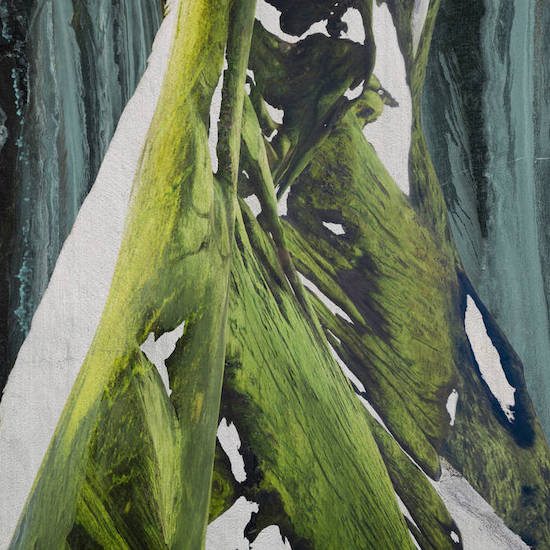Within just one year Belgian artist ‘t Geruis is delivering the follow-up to his debut Various Thoughts and Place. The new album, Slow Dance on Moss Beds, builds on its predecessor, but takes a further step back into reduction and delves into melancholy. If you feel sad, chances are you’ll feel sadder after listening. The first track especially, ‘la petite rivière’, is a study in visceral sadness challenging listeners how much they are willing to take. As Anthony D’Amico’s wrote for Brainwashed about the debut: “as if ‘t Geruis built a homemade microphone that could pick up the sadness of eternity.”
If you made it to the other side – that is, track two – it gets easier. What follows is a collection of fragments of melancholic melodies looped on piano, faintly heard through the haze of electric rushing and droning, layered over ethereal, pulsing bass lines and interwoven with field recordings of the natural and rural world. We are not listening to sound collages. There are melodies and harmonies at work that give the compositions a lyrical feel. The arrangements lean towards experimental contemporary classical.
There is nothing negative to write about the ten well curated tracks of this album; the quality of the production is sublime, the sound is rich and immersive. It’s just… timing. Burial’s Antidawn is still crackling in my ear and Slow Dance on Moss Beds often pursues a sound that is very similar. The dark atmosphere, no vocals, no beats. Burial can’t do without crackling vinyl; ‘t Geruis can’t do without constant droning and rushing. It’s in every track. There are moments when I feel like I’m listening to Antidawn Part II.
Having said that, if you have a liking for Antidawn soundscapes, you will care for Slow Dance on Moss Beds and soon realise that despite formal similarities both records are, in fact, very different. The differences are in the subject matter. Burial’s compositions are rooted in reality, ‘t Geruis’s music is – in the true sense of the word – fantastic.
It’s the city versus the forrest. Concrete versus moss beds. There is a depth and otherworldly-ness to ‘t Geruis’s music that only the natural world can keep up with. The grand archaic sound of ‘gracieux’ evokes majestic mountains, the just over one-minute-short ‘entre les abres’ (‘amongst trees’) is an ode to the sacred – rather than the eerie – silence deep in the woods. There are obvious references to nature, too. Cackling geese, chirping birds, the highly distorted church bells at the end of ‘l’arrivée d’un visiteur’ paint a sonic portrait of the countryside. The record ends with the sound of a rattling horse carriage. Nostalgia is the sister of melancholia.
Slow Dance on Moss Beds is – as the title might even imply – a slow burner. ‘t Geruis’s music is suggestive, it communicates on a deeper, subconscious level. Perhaps that’s why it takes a few listenings to get a feel for the album, to reach that deep level to fully appreciate the beauty of these compositions. The time it takes is worth it.


